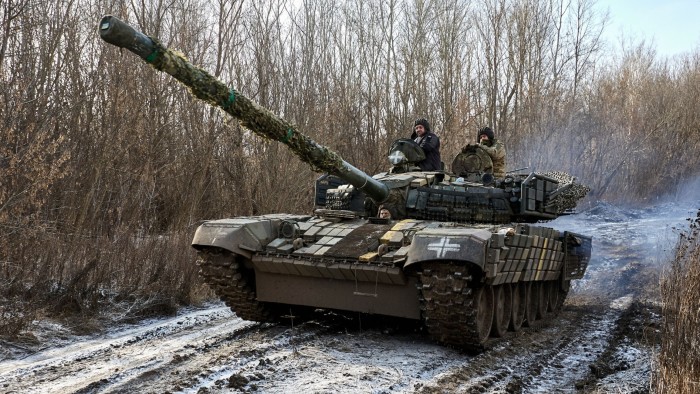The US has asked European capitals to provide detailed proposals on the weaponry, peacekeeping troops and security arrangements they could provide Ukraine with as part of any security guarantees to end its war with Russia.
The request was sent to capitals this week, four western officials briefed on the document told the FT. It came as European leaders demanded to be part of Trump’s negotiations with Vladimir Putin that he announced on Wednesday.
“This [document] is the way that we make sure we are involved,” said one of the officials.
Washington intends the questionnaire, sent to governments by the US State Department, to scope out Europe’s willingness to protect Kyiv after a peace settlement, and the price Europe is willing to pay in exchange for being involved in negotiations with Moscow.
The State Department requested details of military hardware that European capitals would be able to provide and the number of troop brigades they would be prepared to deploy, the officials said.
“The cable poses a number of general questions,” a US official said, adding that it requests “specific proposals or ideas” for what a Europe-led security arrangement might look like.
The request comes ahead of a tour of European capitals by Trump’s Ukraine envoy Keith Kellogg, which begins next week in Brussels.
Kellogg was not listed by the president this week as part of the four-man US team who will hold talks with Moscow, leading officials in Europe and Ukraine to wonder how involved he is in Trump’s peace efforts.
US officials said Kellogg and others were providing options to Trump, who is the ultimate decision maker.
Kellogg said on Saturday at the Munich Security Conference that the discussions were “a two-track process”.
“[US Middle East envoy Stephen Witkoff] has the Russian lane. I have the Ukrainian and European lane,” he said.
Asked whether Kellogg’s influence was waning, a US official said his schedule “speaks for itself”.
“Not only is he part of the team as the White House spokeswoman said, his diplomacy in Munich, in Brussels early next week and the upcoming critical trip to Kyiv, as noted by Zelenskyy personally yesterday, speaks for itself in terms of his leading role in this, working under the president,” a US official said.
The US has indicated it is prepared to accommodate many of Putin’s core demands by pouring cold water on Ukraine’s drive to join Nato and reclaim territory currently occupied by Russia.
On Saturday Kellogg said he did not think Europeans would be “at the table” during the peace negotiations, but that he was talking to European capitals to ensure their views were taken into account.
One senior western official said Kellogg’s focus on what western countries could do to guarantee Ukraine’s security, rather than what financial concessions it could extract from Kyiv in exchange, meant Russia had little interest in dealing with him.
The Kremlin’s focus on figures it saw as having a more direct line to Trump and better command of the brief led Moscow to conclude Kellogg had been partly sidelined, according to three Russian people familiar with the talks.
The US official said Kellogg has been one of Trump’s closest national security advisers for nearly a decade and their relationship is “well-known in Washington”.
Russia feels other interlocutors such as Witkoff, who secured the release of an American teacher from a Russian prison this week, and national security adviser Mike Waltz have a more direct line to Trump and better command of the brief, they said.
“If he’s the envoy, then he probably should have sought out contacts in Russia and Ukraine in short order, hire experts on both countries, and so on,” a former senior Kremlin official said. “Witkoff was snappier than he was.”
Another person involved in Russia’s outreach to the west said Moscow saw Kellogg’s role as largely ceremonial.
“The serious talks, as you know, are with Moscow and you need serious people for that,” the person said. Kellogg “is there to talk to the Ukrainians, talk to the Europeans, go on TV”.
Any progress in the talks would depend on further direct contact between Trump and Putin, the person added.
“Trump’s method is to send someone like that for a bit and then get serious later. Only the problem is his counterpart is Vladimir Putin, who as a specialist in human relations is several leagues above his level.”
Dmitry Peskov, Putin’s spokesperson, said the line-up of negotiators was an internal US matter. “The presidents expressed a political will to build dialogue, and it’s the US president’s prerogative to appoint someone.”
Kellogg’s continued talks with Ukraine and Europe suggest he could still play an important role in the peace process, two of the western officials and the former senior Russian official said.
“Kellogg is still involved,” said the first western official. “Some [European] capitals aren’t taking him seriously, and I think that’s the wrong approach.”
The former senior Russian official said Trump had “forgotten” about Kellogg when naming his negotiators, but then “corrected himself” later by dispatching him to Europe. “Maybe there’ll still be some use for him.”
Read the full article here




